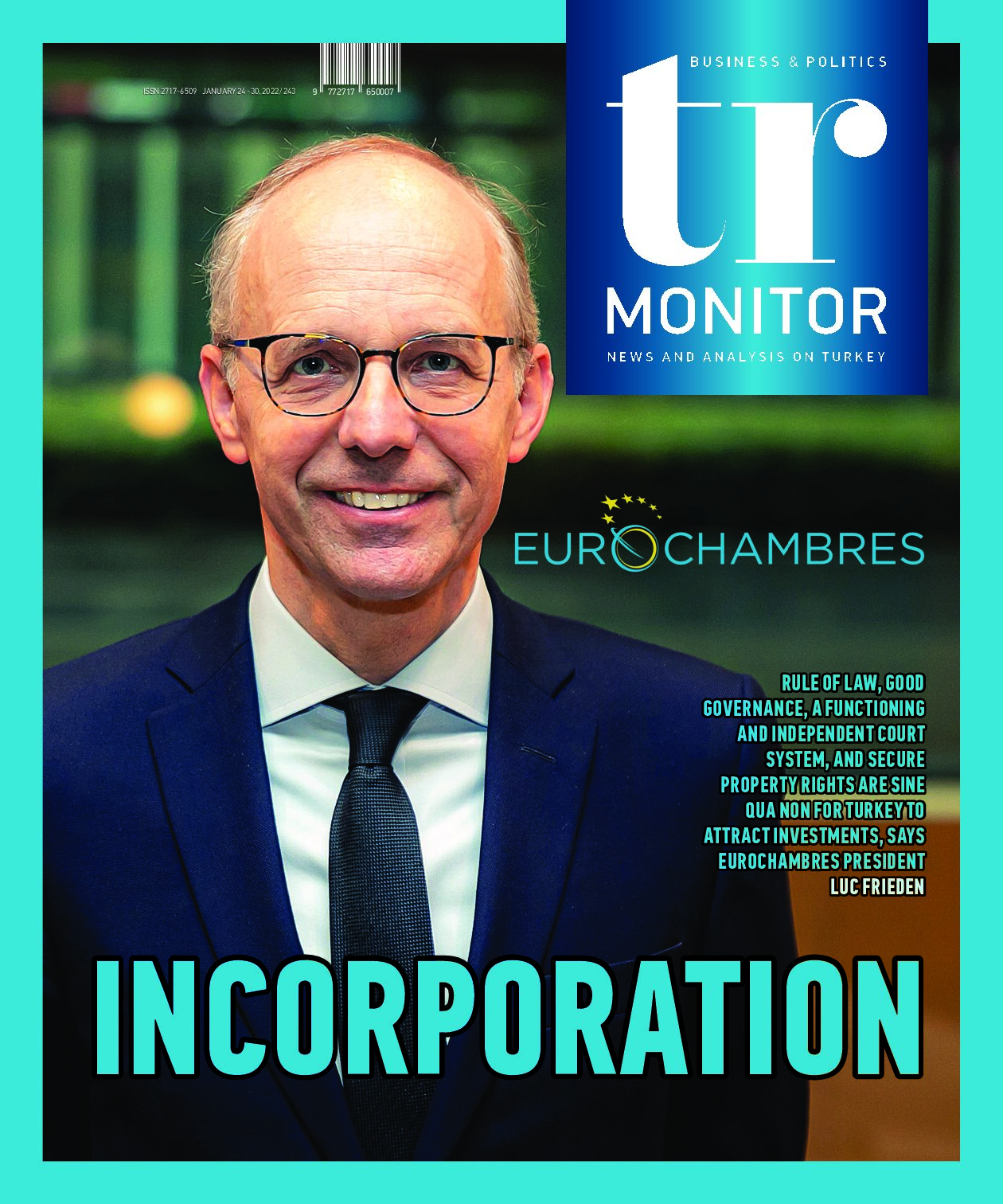It takes more than the geographic proximity to be attractive for investments, according to Luc Frieden, who took office as President of Eurochambres earlier this month. Frieden cites rule of law, good governance, a functioning, and independent court system, and secure property rights as a sine qua non for investments.
By ELIF KARACA
“I will be an ambassador of European companies in Brussels and an ambassador of the European project vis-a-vis the corporate world”, Luc Frieden said on his first day as the President of Eurochambres, the Association of European Chambers of Commerce and Industry, on January 10. Considering Eurochambres’ role in implementing the Turkey-EU Business Dialogue project in cooperation with The Union of Chambers and Commodity Exchanges of Turkey (TOBB), his ambassador role will certainly involve enhancing EU-Turkey economic relations. “Dialogue and mutual understanding between the European and Turkish business communities, as well as between the business community and public authorities are important,” Frieden said in an exclusive interview with daily DUNYA.
Turkey is seen as one of the most important alternative supplier countries for its advantageous location amid supply chain jitters due to the pandemic. Re-shoring of supply chains from Asia to Europe makes sense for European companies so that they become less dependent on global markets, particularly in times of crisis, according to Frieden. “Due to the COVID-19 crisis and the current lack of micro-chips across all industrial sectors, many European companies are having a closer look at their long supply chains. All of the more immediate neighbors of the EU can benefit from this by attracting suppliers,” he said, adding that this is an opportunity for Turkey as well.
Turkey`s geographical situation has a significant advantage for its industry, and its economy has been linked to the EU through a Customs Union for more than 25 years now, Frieden said. Eurochambres is actively following discussions on the development and modernization of this Customs Union, he added. His organization is also working to foment dialogue at all levels.
“This is why Eurochambres has been successfully implementing the Turkey EU-Business Dialogue project in close cooperation with our Turkish member, The Union of Chambers and Commodity Exchanges of Turkey (TOBB). This initiative builds on over 20 years of activities that the European chamber network has been involved in to enhance EU-Turkey economic relations and mutual understanding,” he said.
Boosting exports is one of the top priorities for the Turkish government. When asked what Turkey should do to meet that goal, Frieden underlined that some 40% of all Turkish exports already go to the EU. “Usually, businesses know best where the biggest trade opportunities are. Product groups covered by the Customs Union are at the top of Turkey`s exports to the EU, with automotive, apparel, and chemicals accounting for some EUR 40bn in 2021,” he said. Trade between Turkey and other European countries can be increased for many products, including both imports and exports, he said.
Investors have key requirements
While the Custom’s Union and Turkey’s location put it at an advantage, that’s not enough for investors, according to the Eurochambres President. “It takes more than the geographic proximity to be attractive for such investments,” he said, “There needs to be rule of law, good governance, a functioning, and independent court system, and secure property rights.” The better Turkey addresses these key investment requirements, the more it will attract business, he added.
The EU and Turkey are aiming to repair the economic and social damage brought by the pandemic, kick-start the recovery, and prepare a better future for the next generation. “These elements must all factor in our long-term collaboration,” he noted.
The European Green Deal should also be considered during the modernization of the Customs Union between Turkey and the EU, he said. “The circular economy and industrial decarbonization, where both the EU and Turkey have ambitious agendas, should become core elements of our future relations,” he said, adding that innovative Turkish businesses are an integral part of European industrial value chains.
‘Modernization of CU is complex’
However, the modernization and upgrade of the Customs Union (CU) are one of the most complex ongoing projects in European trade politics, Frieden stressed. The Customs Union with Turkey is one of the most advanced commercial relationships that the EU has with any third country, he added. The original treaty was negotiated in 1993 and has more than tripled the EU-Turkey trade volume since 1995. “However, the world has changed considerably since then, so adaptation to current and future business needs is necessary. This adaptation should cover not only scope but also implementation. Services and public tenders need to be considered, while enforcement and controls need to be better synchronized to ensure proper functioning,” he said.
The EU-Turkey relationship is based on a strong and deep economic cooperation, and organizations like Eurochambres are very useful in discussing and intensifying those relations in a way that is beneficial for all its member countries’ businesses and chambers, Frieden said.
As the head of an organization representing chambers of commerce from 43 countries, Luc Frieden also wants to use this platform to further develop complex trade relations with the EU’s neighboring countries, particularly Switzerland and the United Kingdom, as well as with other key international trading partners, especially the United States, China, and Russia.
Key support from previous president Leitl
Luc Frieden, Chairman of the Luxembourg Chamber of Commerce, was elected president of the Association of European Chambers of Commerce and Industry (Eurochambres) for the 2022-23 term at the general assembly on October 15. He took over the role of the previous president, Christoph Leitl, on January 10, 2022. Outgoing President Leitl expressed strong support for his successor, stating: “Luc Frieden will take over as Europe’s economic recovery begins to gather momentum, and Eurochambres has a vital role to play in working with the EU institutions to maintain this positive trajectory. Given Luc’s business acumen, political experience, and international outlook, I am confident that the European chamber network will fulfill this responsibility to great effect”.
Frieden has been Chairman of the Luxembourg Chamber of Commerce since 2019. He is a member of the board of directors of several companies and organizations and is a practicing lawyer. From 1998 to 2013, he served as Luxembourg’s Minister of Justice and Minister of Finance. He was also a member of the Eurogroup and the Ecofin Council of Ministers and chaired the 2013 Annual Meetings of the World Bank and the International Monetary Fund (IMF). Frieden holds a Maîtrise in business law from the Université de Paris 1 Panthéon-Sorbonne (France), an LLM degree from the University of Cambridge, and an LLM degree from Harvard Law School. He has published numerous articles on legal, political, and European issues. He is the co-author of the book ‘Europa 5.0’ (Campus Verlag 2016) on economic growth in Europe.
Creating an EU capital markets union is high on Eurochambres’ list of priorities
The EU faces major challenges, both at a political and economic level. The transformation to a climate-friendly and CO2-free economy requires great effort from all companies in Europe. Businesses need favorable and predictable framework conditions to operate and make the EU Green Deal a success, as demanded by Eurochambres. Frieden wants to encourage companies to make better use of the opportunities offered by the EU’s internal market, while at the same time actively cooperating with EU institutions. Free and fair international trade is indispensable for the competitiveness of European companies. “Only these can enable growth and prosperity for all,” Frieden said in a press release shared by Eurochambres on his first day in the office earlier this month. The creation of an EU capital markets union as a source of financing for companies is high on the Chamber’s list of priorities. Promoting investment and increasing prosperity will be pushed by Eurochambres under Frieden’s presidency, it read. “Europe needs ESG and business-friendly frameworks that encourage investment in digitalization, sustainable growth, and technology. Therefore, we need close cooperation between public institutions, businesses, and citizens to make Europe a successful continent,” Frieden said.
20 million businesses with 120 million+ employees
Established in 1958 as a direct response to the creation of the European Economic Community, the Association of European Chambers of Commerce and Industry (Eurochambres) acts as the eyes, ears, and voice of the chambers and business community, according to its official website. Eurochambres represents over 20 million businesses in Europe through 45 member organizations – 43 national associations of chambers of commerce and industry, two transnational chamber organizations, and a European network of 1,700 regional and local chambers. More than 93% of the organization is comprised of small and medium-sized enterprises (SMEs) and member businesses of the chamber employ over 120 million people.










